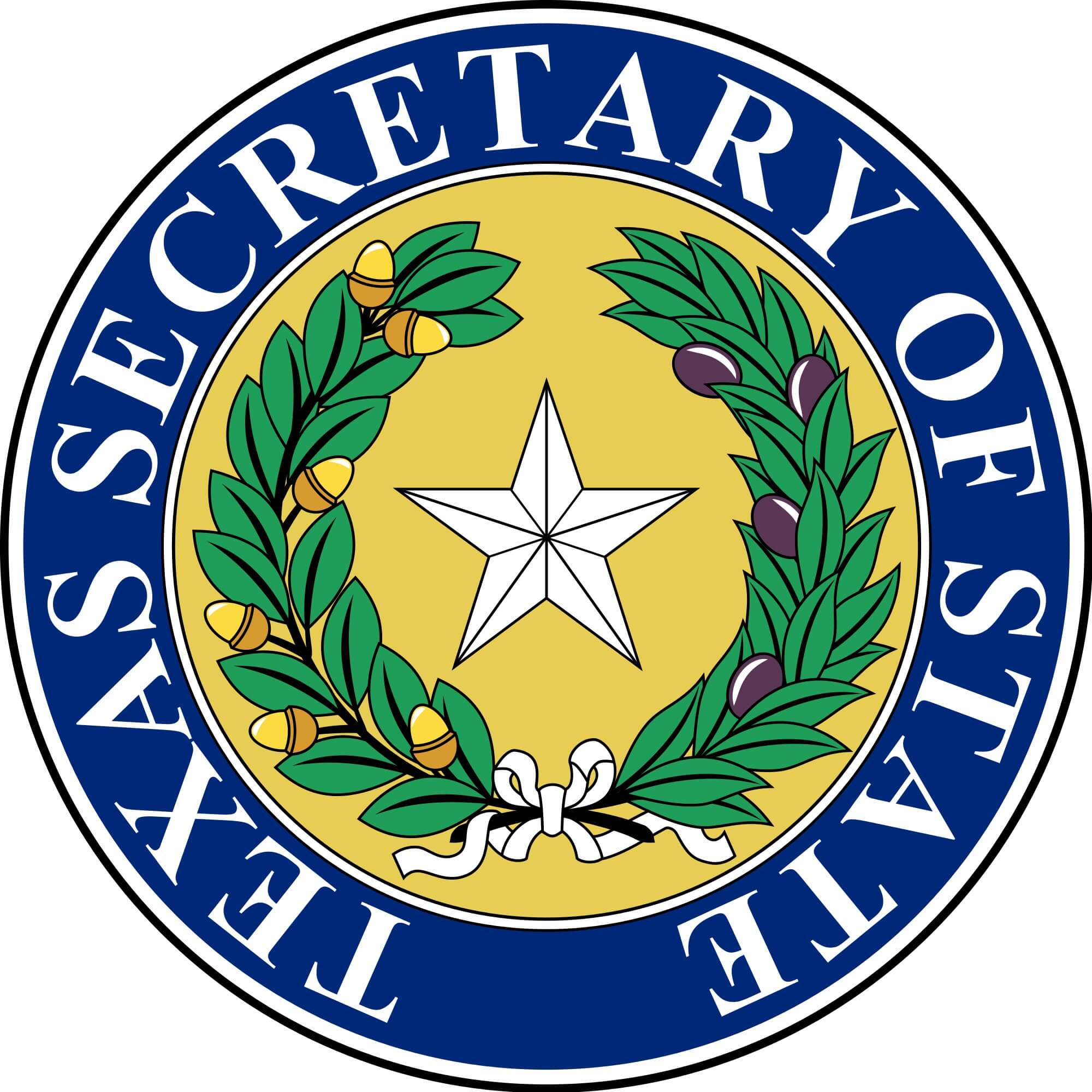

Are you on a tight State of Texas apostille certificate or Texas authentication certificate document filing deadline?
Feeling overwhelmed, confused and stressed out about the whole Texas Secretary of State Hague Apostille Convention authentication, apostille, legalization, and attestation document filing process and requirements?
Don’t worry your pretty little head off because we’re going to explain in great detail exactly how the entire Texas document apostille and Texas document authentication processing works from start to finish. We’ll do this with easy to understand apostille for Texas how to videos that you can watch and with two different step-by-step apostille in Texas flow chart graphics that can be seen below on this page.
We’re also going to explain some of the industry myths and the three most common reasons why your documents could be rejected by the State of Texas during the expedited Texas apostille and authentication document filing process.
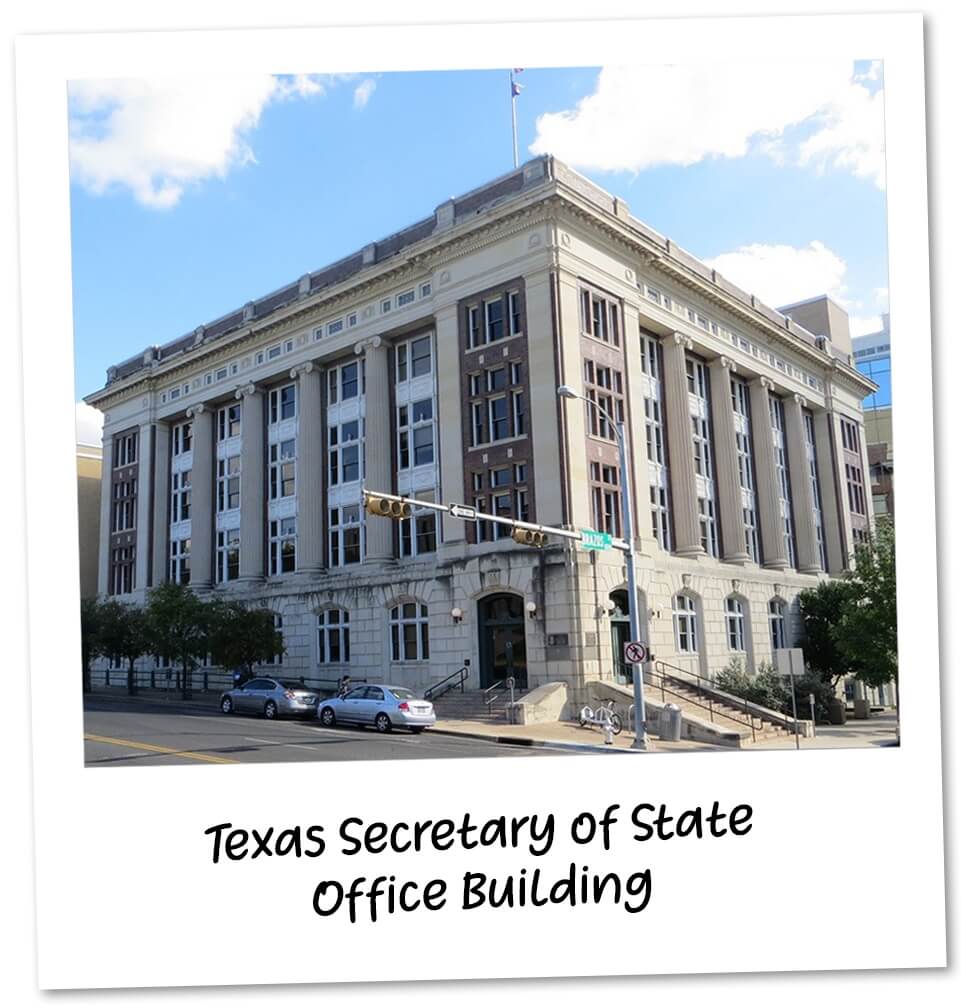
First off the Texas Secretary of State building is located at 1019 Brazos Street, Austin, TX 78701 right across from the state capital.
It is the only location in the world where you or your company can be issued a Texas apostille certificate or Texas authentication certificate on personal, business, or corporate legal documents to be used in a foreign country.
This means there are no other satellite or local branch offices located in Texas (not Dallas, Fort Worth, Plano, Arlington, Irving, Houston, Amarillo, Abilene, Lubbock, San Antonio, Corpus Christi, Laredo, or El Paso) or anywhere else in the United States.
A U.S. foreign consulate, consular, consul, or embassy office or a notary public does not and cannot issue or create a Texas apostille certificate or Texas authentication certificate on any type of legal document.
You cannot email, fax or text your documents anywhere to receive a Texas apostille certificate or Texas authentication certificate (two types of document exceptions to this statement). Your original documents must dropped off via walk-in services or mailed in via mail-in services to be accepted by the Texas Secretary of State.
Most people think there legal documents will physically receive an Texas apostille stamp or Texas apostille seal (like a ink stamp that a public notary places on a legal document) from the Texas Secretary of State’s office on their documents, but this is incorrect.
Below are real examples of what a Texas apostille certificate and Texas authentication certificate will look like.
Your successfully apostilled or authenticated Texas originated document will come back to you from the Texas Secretary of State office stapled with a 8 ½ x 11 apostille certification or authentication certification attached to it by the TXSOS.
Please be aware that if the staple comes out of your Texas apostille certificate or Texas authentication certificate the foreign government or entity that requested and required you to get a Texas apostille or Texas authentication could possibly reject your documents when you try to file and submit it with them.
China consulates and the Chinese embassy in Washington D.C. for example will regularly reject people’s and companies documents solely for this minor little snafu.
So please be careful when handling your Texas apostilled and Texas authenticated documents because we don’t want you to have to go through this entire document legal process a second time.
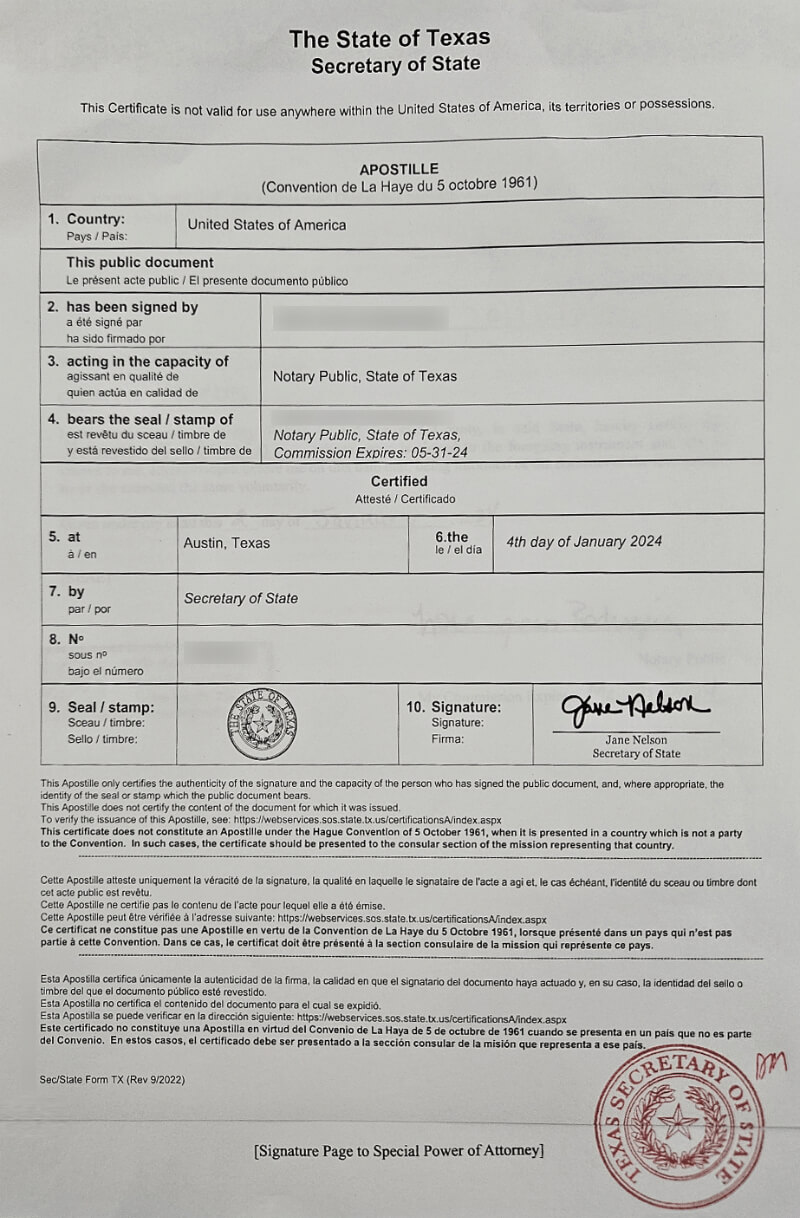
New Non-Recordable Document Texas Apostille
Certificate As of 10/1/23
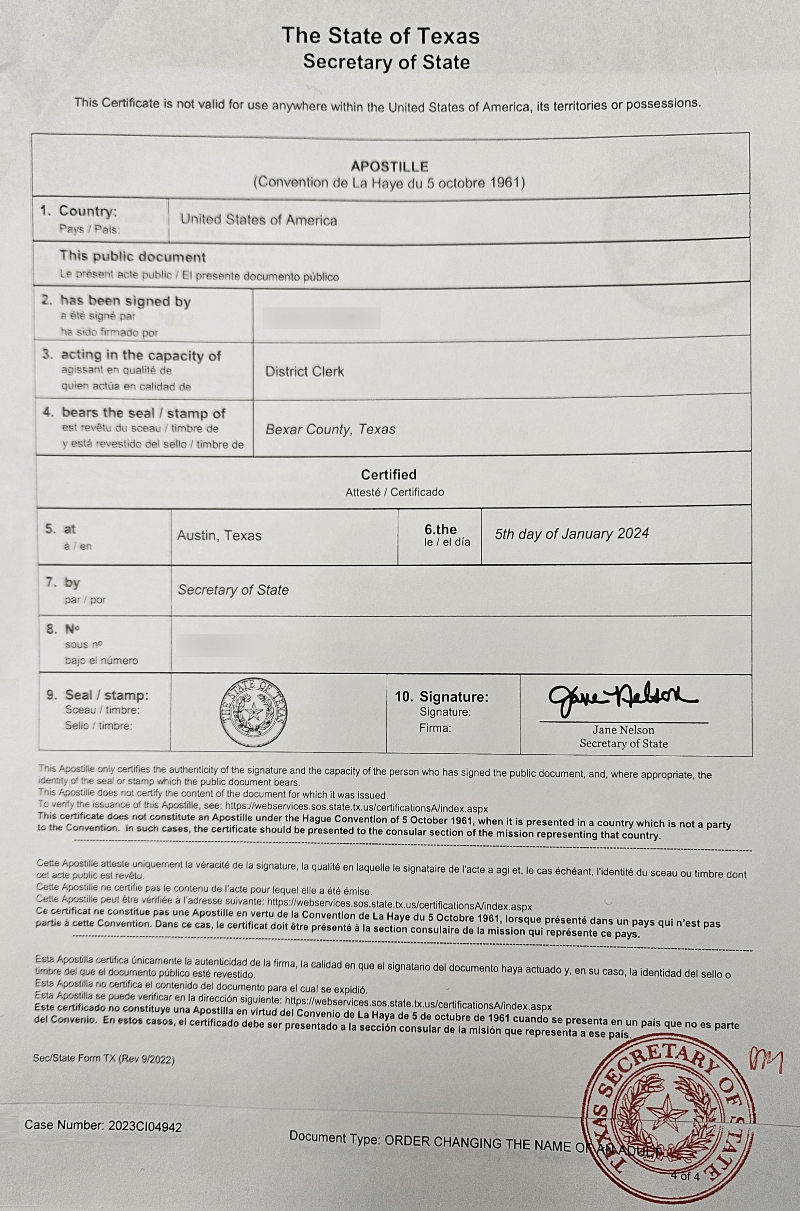
New Recordable Document Texas Apostille
Certificate As of 10/1/23
Recordable documents as defined by the Texas Secretary of State are Texas birth certificates, Texas death certificates, Texas birth verification letters, Texas death verification letters, Texas divorce verification letters, Texas marriage verification letters, Texas marriage licenses, Texas marriage certificates, Texas marriage application forms, Texas divorce decrees, Texas divorce certificates, Texas judgments, Texas DPS vehicle title history report, Texas DPS criminal history records, and Texas cremation certificates.
Non-recordable documents as defined by the Texas Secretary of State are college/university, high school, middle school, and elementary school diplomas, degrees, grades, transcripts, and attendance records, general educational development (GED), criminal background checks (police, sheriff, county, TXDOT), powers of attorneys (POA), wills, trusts, adoption, utility and phone bills, bank, credit union, stocks, bonds, investment, and insurance statements, immigration, bill of sales, affidavits, agreements, contracts, translated documents (the documents that you submit to us can be in any foreign language but the entire notary acknowledgement area must be in all English), copies of photo identification (driver’s license, visa, passport, DOD ID card, permanent resident card (green card), India pan card (Indian public account number), state or military issued photo ID card), business or corporation related documents that need to be apostilled or authenticated they must be properly notarized first by a Texas notary public before you can mail them or drop them off with us to rush apostille or authenticate file them on your behalf.
Please note that the notarization on your non-recordable documents cannot be done by a notary public licensed in any another U.S.A state or country.
Only a Texas notary public can be used.
Meaning your non-recordable documents will be rejected by the Texas Secretary of State office if your documents are notarized by a non-Texas notary public.
On any non-recordable document a Texas notary public or you must write down on your document or attach a piece of paper to your document that has the exact notary Jurat or Acknowledgement verbiage shown below to receive an Texas apostille certificate or Texas authentication certificate on your document.
If the below jurat or acknowledgement (only choose one) notary public verbiage is not written, typed, or attached to your non-recordable document your document will be rejected by the Texas Secretary of State office when we go attempt to file it for you.
Name of affiant = you or whoever is signing the document in front of a Texas notary.
Notaries make this error all the time so please make sure the notary writes in your (signers) name in the name of affiant space not the notary’s name. Otherwise your document will be rejected by the state because of the notary’s mistake.
Jurat:
State of Texas
County of
Sworn to and subscribed before me on the day of (month) (year),
by (name of affiant).
_________________________________
Texas notary signature
Acknowledgement:
State of Texas
County of
Before me, (notary public name), on this day personally
appeared (name of affiant), known to me or proved to me on the basis of satisfactory evidence to be the person whose name is subscribed to the foregoing instrument and acknowledged to me that he executed the same of the purposes and consideration therein expressed.
Given under my hand and seal of office this day of (month), and (year).
_________________________________
Texas notary signature
You must write the above Texas notary jurat or acknowledgement verbiage on all non-recordable documents.
On our Texas State apostille order form PDF that can be downloaded further down on this page we also include this exact Texas notary verbiage on the second page of our Texas apostille service order form.
We did this so you can easily print that page out and show it to a Texas notary public if typing out the verbiage on your document beforehand is not possible for you.
The second most common reason why documents we attempt to apostille or authenticate for our customers get rejected is because of Texas notary public errors.
When a Texas notary public notarizes a non-recordable document that will be used to apply to receive a Texas apostille certificate or Texas authentication certificate the Texas notary public must always do five things.
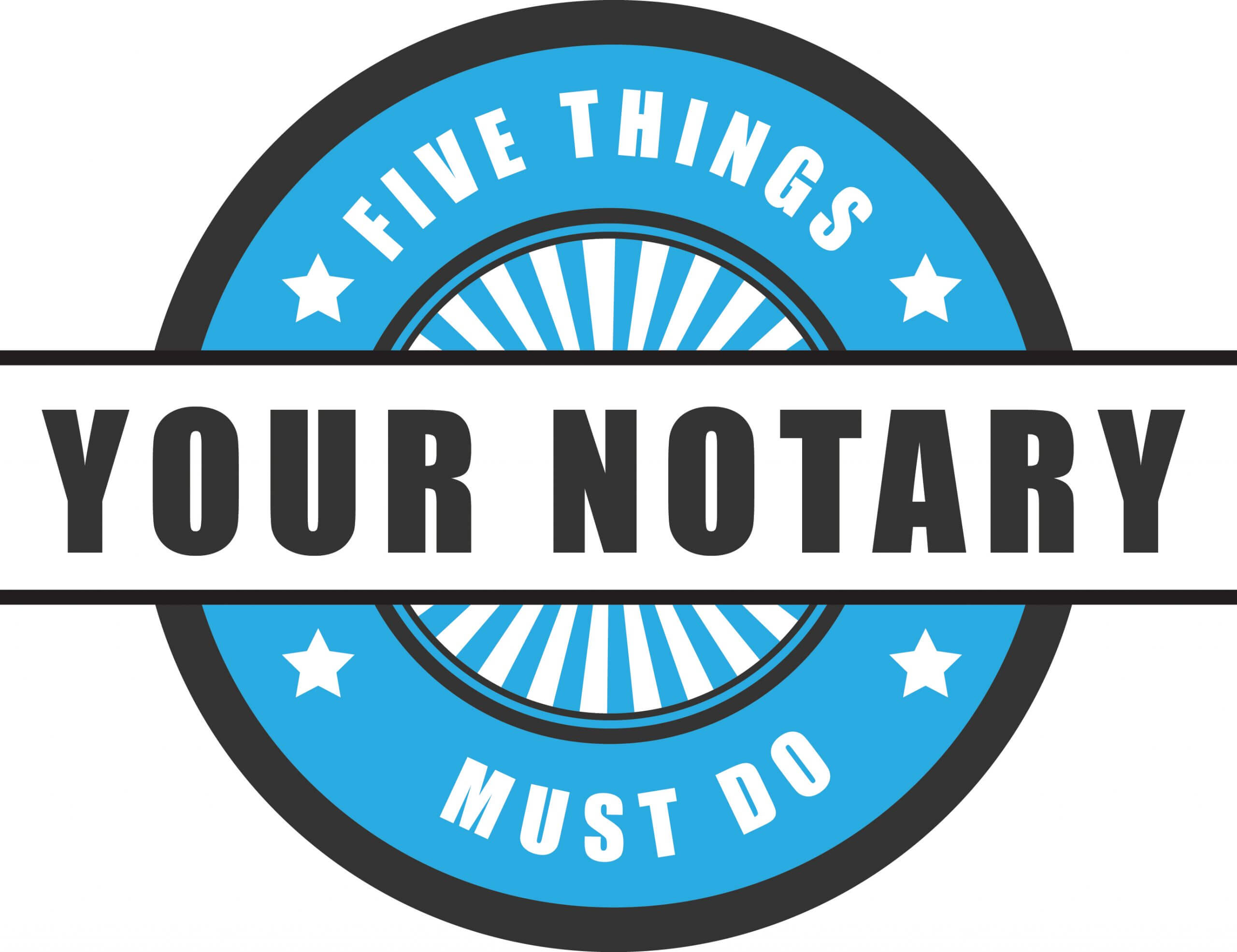
1) A Texas notary public must place their non-expired notarial stamp on a non-recordable document.
The Texas Secretary of State office prefers the Texas notary stamp to be placed on the same page of where the document holder/affiant signed.
But you can also attach a separate piece of paper to the non-recordable document with the notarization on it or the notarization can be placed on the backside of the document if there is no space on the frontside to do it.
2) A Texas notary public must write down on the document the exact date of when they witnessed the person signing the document in and around the notarial acknowledgment area.
This means it does not matter if a date is listed somewhere else within the body of the legal document.
If this is not done the Texas Secretary of State authentications unit will reject the document.
3) A Texas notary public must print and sign their name on a document exactly how their name is spelled on their official Texas notary stamp for each and every document that you want apostilled or authenticated in Texas.
If the Texas notary public signs or prints their name on a document differently then what is listed on their official licensed Texas notary stamp the State of Texas Secretary of State office will reject the document.
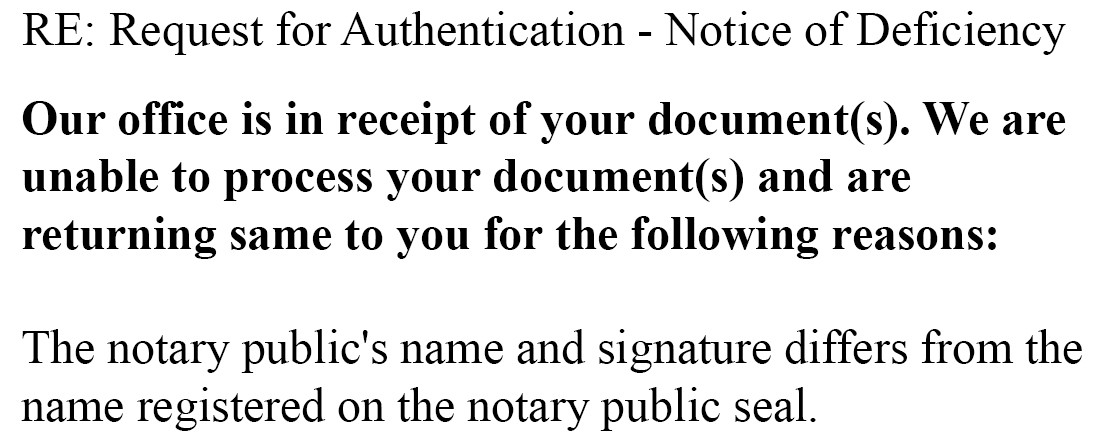
4) The notary jurat or acknowledgement verbiage that is required to be placed on all non-recordable documents must be written or typed out completely in English and in no other foreign language.
The document that you want to receive a Texas apostille certificate or Texas authentication certificate on can be in a non-English language.
But the entire (not just some of it) Texas notary public jurat or acknowledgement verbiage must be in all English. If it’s not 100% in English the Secretary of State will reject the document.
5) The signature of the notary, the document holder (the person who is signing the document in front of the Texas notary public) or the person who signed the document or certified photocopy cannot be an autopen or an electronic copy signature.
An autopen or signing machine is a device used for the automatic signing of a signature or autograph or a photocopy of a signature and an original signature must be used on your documents.
A Texas Secretary of State official may conduct a smudge test where they literally wet there finger and rub the document signature to see if it smudges or not (we’ve seen this done firsthand).
The State of Texas will reject the document if the document signature doesn’t smudge at all and Texas Secretary of State officials will also use a jeweler magnifying glass to check to see if the signature on the document is in fact a photocopy or autopen and not an original signature on the document.
The third most common reason why documents that our customers send us get rejected by the Texas Secretary of State office is because the documents we were sent did not originate in the State of Texas.
What this means is the Texas Secretary of State office can only issue Texas apostille certificates and Texas authentication certificates on recordable and non-recordable documents that originated or were issued by a government entity located within the State of Texas.
If your documents were issued from the federal government (FBI, IRS, SSA, DHS, ATF, USCIS, DOD, USDA, USDOT, FDA, DOE, USPTO, EPA, DEA, USDOC, DOJ, VA, etc.) they can only be apostilled or authenticated at the U.S Department of State office in Washington D.C.
Yes, Apostille Texas can help rush file those types of federal documents for you as well.
For example, let’s say you currently live in the State of Texas but you were legally born in the State of California, your parent died in the State of New York, you got married in the State of Washington, and you got divorced in the State of Florida.
In these scenarios you can only receive a state-level apostille or authentication document certificate on your California birth certificate from the California Secretary of State, an apostille on your New York death certificate from the New York Secretary of State, an apostille on your Washington marriage license from the Washington Secretary of State, and an apostille on your Florida divorce decree from the Florida Secretary of State.
Make apostille document sense?